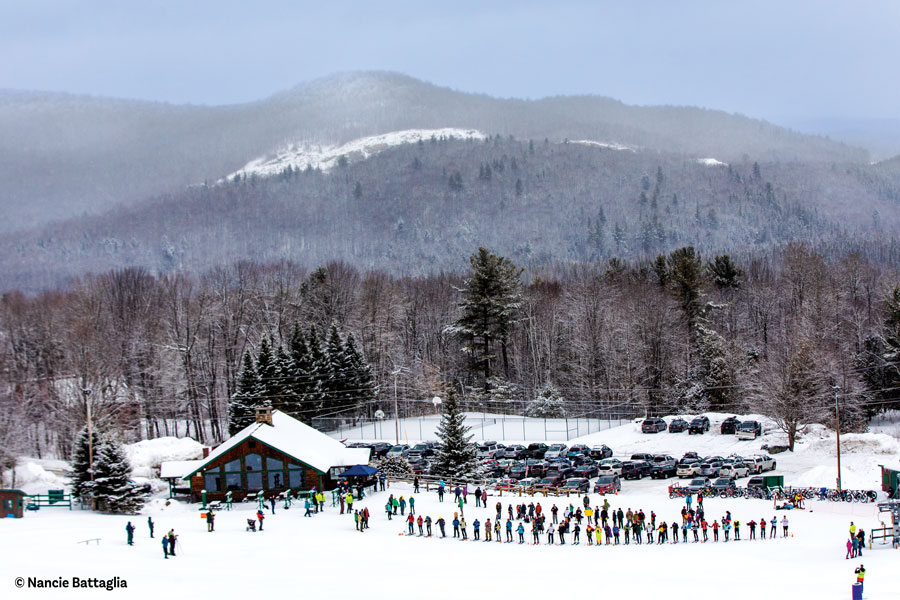“As I sit by a roaring fire and wait for water to boil, my son, Jeremiah, is busy exploring the elements of nature. Every move he makes I am ready with my throwaway camera. Ready to document our story,” wrote a young woman named Chelsea in the Osprey Lean-to journal one June morning. “I was paralyzed nine years ago doing something I loved very much—snowboarding. I was at Big Tupper, in Tupper Lake, not far from here. I fell and … well, here I am. Since that day I have been struggling to fulfill the dreams
I had.… I can’t begin to express how sacred my love for nature is. This experience has brought me closer to the person I once was—no, to the person I have always been.… The world is unwelcoming to the differently abled. It is great to feel home again in nature.”
Just north of Long Lake, at the end of a dirt road and beyond an ornate gate, is a campground like no other in the northeast. Sure, there’s a pretty lake with a loon family in residence, and yes, there are picnic tables and privies. But take a closer look—or use your fingers and feet to feel—and you’ll find significant differences. At this campground, said Barbara Devore, who uses a wheelchair, “accessibility is the norm,” not an afterthought.
International Paper John Dillon Park (named for a former IP CEO), about 200 acres on Grampus Lake and Handsome Pond, opened in 2006 to much fanfare. The facility, on an easement parcel carved from International Paper forestland, was several years in planning, with input from the Department of Environmental Conservation’s universal access committee, green groups, Paul Smith’s College, the town of Long Lake and many others. An engineer who uses a wheelchair helped design shelters that have ramps, handrails and fold-down sleeping platforms. A blind outdoor enthusiast suggested ways to build simple wooden signs with raised lettering, recalling California’s troubles with Braille trail signs made of bronze that became too hot to touch on a summer day. Paths meander through classic Adirondack mixed forest, but these are the product of thousands of hours to find routes with suitable grades; at stream crossings bridges are wide and delineated with rustic railings, in harmony with the setting, yet safe and secure. “Here there are miles and miles of trails,” said Devore, from Delmar, “not just a quarter-mile. If I go to a nature center with a quarter-mile of accessible trails I’m just getting warmed up.”
The lean-tos accommodate children and adults with impaired mobility, although the structures look exactly like the Adirondack icon. They’re made of logs, perch above the lake in pairs and have ingenious fire pits with cooking grates that swivel out of the way, the better to grill your camp dinner without teetering over burning coals. The surfaces around the lean-tos are hard packed, so navigating with cane, crutches, walker or wheelchair is easy. The outhouses are spacious, created with disabled visitors and caregivers in mind.
In Black Bear Lean-to’s notebook 13-year-old Abigail raved about her visit and a unique amenity. “This place is awesome for power wheelchairs. I got my first fish ever here. I love the boardwalk. I like how if this power chair dies, a charger can be brought to the site. I can’t wait to come back with my friends.”
Because Dillon Park is off the grid, planners had to anticipate a problem they knew would arise: how to recharge batteries without a mile-long extension cord. Solar panels power lights in the campground as well as a cart that can trundle up to a site for reviving wheelchairs and medical apparatus.
A photovoltaic setup supports another adaptation: a party barge with an electric motor that barely purrs as it cruises on Grampus Lake. Devore, an avid kayaker, marveled at the easy boarding. “Usually getting into a motorboat is a big deal. At Dillon Park I wheeled my chair onto the dock and there was a little gate
on the boat to open, so I just rolled right in under my own steam.”
In the past three summers about 4,200 people of all ages and abilities have swatted blackflies, chased bold chipmunks away from their backpacks, snagged their lures after casting into the weeds and burned marshmallows into carbonized goo. In other words, they’ve hiked, fished and camped like everybody else. The luckiest ones are the 250-plus who overnight here each season, catching the call of a loon as it echoes across the water or scanning the astonishing stellar array of a truly dark sky.
Another entry from Osprey Lean-to gave a glimpse of an intrinsic aspect of the park, the calming power of nature. A caregiver wrote, “We brought a group of four handicapped men for a relaxing day. This is not an experience that they have ever had. I believe they lived most of their lives in institutions and now live
in a group home. While here they relaxed in the lean-to, enjoyed a campfire, hotdogs and s’mores. Although they are unable to talk … I can see they are enjoying themselves and relaxing by the looks on their faces. And the silence! John is not making a sound, wow!”
If You Go
International Paper John Dillon Park is off Route 30 about four miles north of Long Lake’s town beach. Operated by Paul Smith’s College, the facility opens in May and closes in October. Day use from 9 a.m. to 6 p.m. is free and open to the public; camping in the seven lean-tos and one tent site is also free but a reservation is required (www.johndillonpark.org; 518-524-6226 or 518-327-6126 off-season). There are about 3.5 miles of trails. Service animals are welcome, of course, but dogs must be leashed at all times. There is no swimming at either water body, although a dock provides a good platform for fishing, canoe and kayak launching or bird-watching. Paul Smith’s College students and faculty are park staff, offering assistance with camping, nature observation and other activities. There are no medical personnel on-site.
























